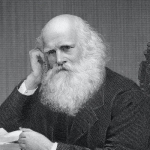Can we not force from widow'd poetry,
Now thou art dead (great Donne) one elegy
To crown thy hearse? Why yet dare we not trust,
Though with unkneaded dough-bak'd prose, thy dust,
Such as th' unscissor'd churchman from the flower
Of fading rhetoric, short-liv'd as his hour,
Dry as the sand that measures it, should lay
Upon thy ashes, on the funeral day?
Have we no voice, no tune? Didst thou dispense
Through all our language, both the words and sense?
And sober Christian precepts still retain,
Doctrines it may, and wholesome uses, frame,
Grave homilies and lectures, but the flame
Of thy brave soul (that shot such heat and light
As burnt our earth and made our darkness bright,
Committed holy rapes upon our will,
Did through the eye the melting heart distil,
And the deep knowledge of dark truths so teach
As sense might judge what fancy could not reach)
Must be desir'd forever. So the fire
That fills with spirit and heat the Delphic quire,
Which, kindled first by thy Promethean breath,
Glow'd here a while, lies quench'd now in thy death.
The Muses' garden, with pedantic weeds
O'erspread, was purg'd by thee; the lazy seeds
Of servile imitation thrown away,
And fresh invention planted; thou didst pay
The debts of our penurious bankrupt age;
Licentious thefts, that make poetic rage
A mimic fury, when our souls must be
Possess'd, or with Anacreon's ecstasy,
Or Pindar's, not their own; the subtle cheat
Of sly exchanges, and the juggling feat
Of two-edg'd words, or whatsoever wrong
By ours was done the Greek or Latin tongue,
Thou hast redeem'd, and open'd us a mine
Of rich and pregnant fancy; drawn a line
Of masculine expression, which had good
Old Orpheus seen, or all the ancient brood
Our superstitious fools admire, and hold
Their lead more precious than thy burnish'd gold,
Thou hadst been their exchequer, and no more
They each in other's dust had rak'd for ore.
Thou shalt yield no precedence, but of time,
And the blind fate of language, whose tun'd chime
More charms the outward sense; yet thou mayst claim
From so great disadvantage greater fame,
Since to the awe of thy imperious wit
Our stubborn language bends, made only fit
With her tough thick-ribb'd hoops to gird about
Thy giant fancy, which had prov'd too stout
For their soft melting phrases. As in time
They had the start, so did they cull the prime
Buds of invention many a hundred year,
And left the rifled fields, besides the fear
To touch their harvest; yet from those bare lands
Of what is purely thine, thy only hands,
(And that thy smallest work) have gleaned more
Than all those times and tongues could reap before.
But thou art gone, and thy strict laws will be
Too hard for libertines in poetry;
They will repeal the goodly exil'd train
Of gods and goddesses, which in thy just reign
Were banish'd nobler poems; now with these,
The silenc'd tales o' th' Metamorphoses
Shall stuff their lines, and swell the windy page,
Till verse, refin'd by thee, in this last age
Turn ballad rhyme, or those old idols be
Ador'd again, with new apostasy.
Oh, pardon me, that break with untun'd verse
The reverend silence that attends thy hearse,
Whose awful solemn murmurs were to thee,
More than these faint lines, a loud elegy,
That did proclaim in a dumb eloquence
The death of all the arts; whose influence,
Grown feeble, in these panting numbers lies,
Gasping short-winded accents, and so dies.
So doth the swiftly turning wheel not stand
In th' instant we withdraw the moving hand,
But some small time maintain a faint weak course,
By virtue of the first impulsive force;
And so, whilst I cast on thy funeral pile
Thy crown of bays, oh, let it crack awhile,
And spit disdain, till the devouring flashes
Suck all the moisture up, then turn to ashes.
I will not draw the envy to engross
All thy perfections, or weep all our loss;
Those are too numerous for an elegy,
And this too great to be express'd by me.
Though every pen should share a distinct part,
Yet art thou theme enough to tire all art;
Let others carve the rest, it shall suffice
I on thy tomb this epitaph incise:
Here lies a king, that rul'd as he thought fit
The universal monarchy of wit;
Here lie two flamens, and both those, the best,
Apollo's first, at last, the true God's priest.


















Comment form: